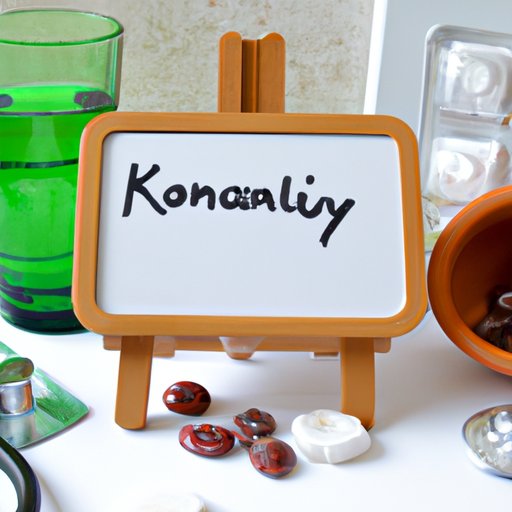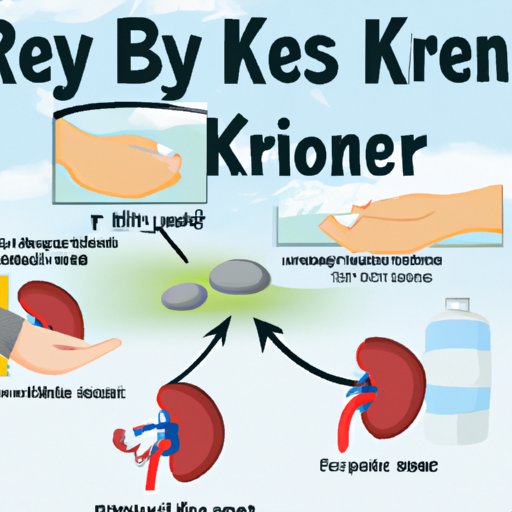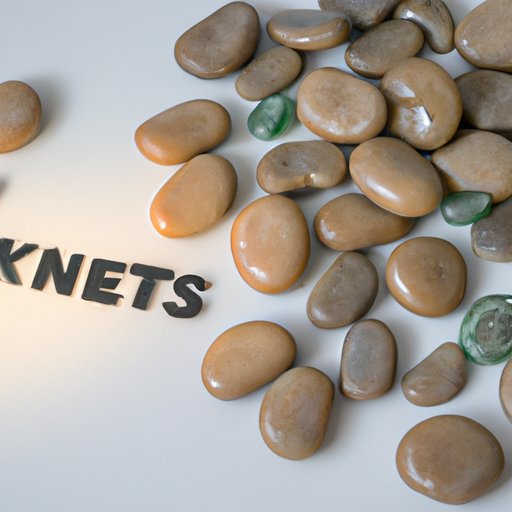Introduction
Kidney stones are hard mineral deposits that form within the kidneys. They are usually made up of calcium, oxalate, uric acid, or cystine. If the stones become large enough, they can cause severe pain in the lower back, sides, groin, or abdomen. In some cases, the stones can even block the flow of urine, resulting in infection or other complications. It’s important to understand the causes, symptoms, and treatments for kidney stones in order to prevent them from occurring.
Causes of Kidney Stones: Exploring the Risk Factors
Kidney stones have many possible causes. Diet, dehydration, medications, and genetics can all contribute to the formation of kidney stones. Let’s take a closer look at each of these potential causes.
Diet
Certain dietary habits can increase the risk of developing kidney stones. Eating too much animal protein, sodium, and processed foods can increase the amount of calcium and oxalate in the body, which can lead to the formation of stones. Eating too few fruits and vegetables can also increase the risk, as these foods contain compounds that help break down minerals like calcium and oxalate.
Dehydration
Not drinking enough water can also increase the risk of kidney stones. When the body is dehydrated, it cannot produce enough urine to flush out excess minerals. As a result, these minerals can accumulate and form stones.
Medications
Certain medications can also increase the risk of kidney stones. Antacids containing calcium carbonate, diuretics, and some chemotherapy drugs can all increase the amount of calcium in the body, leading to the formation of stones.
Genetics
In some cases, genetics can play a role in the development of kidney stones. People with certain genetic conditions may be more prone to forming stones than others.

Diagnosis and Treatment for Kidney Stones
If you suspect you have kidney stones, your doctor can perform a variety of tests to diagnose the condition. These tests may include a urine test, blood test, X-ray, CT scan, or ultrasound. Once the stones have been diagnosed, your doctor will discuss treatment options with you.
Treatment for kidney stones depends on the size and type of stone. Smaller stones may pass on their own, while larger stones may require surgical removal. Other treatment options include shock wave lithotripsy, ureteroscopy, or percutaneous nephrolithotomy. Your doctor will discuss the best option for you.

Dietary Tips for Preventing Kidney Stones
Making lifestyle changes can help reduce the risk of developing kidney stones. Here are some dietary tips for preventing kidney stones:
Increase Water Intake
Drinking plenty of water is essential for preventing kidney stones. Aim to drink at least 8 glasses of water per day. This will help keep your body hydrated and flush out any excess minerals.
Limit Sodium Intake
Eating too much sodium can lead to an increase in calcium in the urine, which can contribute to the formation of stones. Try to limit your sodium intake to no more than 2,300 mg per day.
Reduce Animal Protein Intake
Eating too much animal protein can increase the amount of calcium in the urine, so it’s best to limit your intake. Choose lean cuts of meat and aim to eat plant-based proteins such as beans, lentils, and tofu.
Increase Calcium Intake
Although too much calcium can lead to kidney stones, it’s still important to get enough calcium in your diet. The best way to do this is to eat calcium-rich foods like dairy products, dark leafy greens, and fortified cereals.

Natural Remedies for Treating Kidney Stones
There are a number of natural remedies that can help treat kidney stones. Herbal remedies, homeopathy, and acupuncture have all been shown to be effective in treating kidney stones. Talk to your doctor before trying any of these alternative therapies.

How to Manage Pain from Kidney Stones
Kidney stones can be incredibly painful. To manage the pain, your doctor may recommend taking over-the-counter pain relievers such as ibuprofen or acetaminophen. Applying hot or cold compresses to the area can also help relieve pain.
The Link Between Genetics and Kidney Stones
In some cases, genetics can play a role in the development of kidney stones. Identifying genetic risk factors can help doctors predict a person’s likelihood of developing stones. Genetic testing may be recommended if there is a family history of kidney stones.
Understanding the Different Types of Kidney Stones
There are four main types of kidney stones: calcium oxalate stones, uric acid stones, struvite stones, and cystine stones. Each type is caused by different factors and requires different treatments. It’s important to understand the differences between these types of stones in order to get the most effective treatment.
Conclusion
Kidney stones can be a painful and uncomfortable condition. Understanding the causes, symptoms, treatments, and prevention methods is key to avoiding or managing the condition. With the right information, you can reduce your risk of developing kidney stones and seek appropriate treatment if needed.
(Note: Is this article not meeting your expectations? Do you have knowledge or insights to share? Unlock new opportunities and expand your reach by joining our authors team. Click Registration to join us and share your expertise with our readers.)
